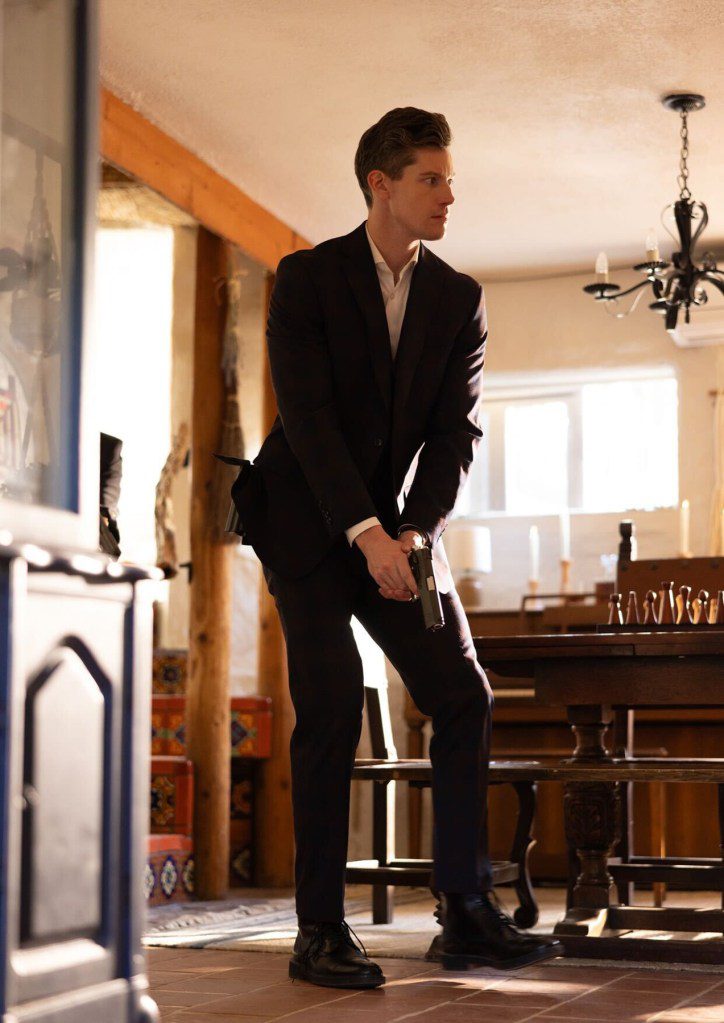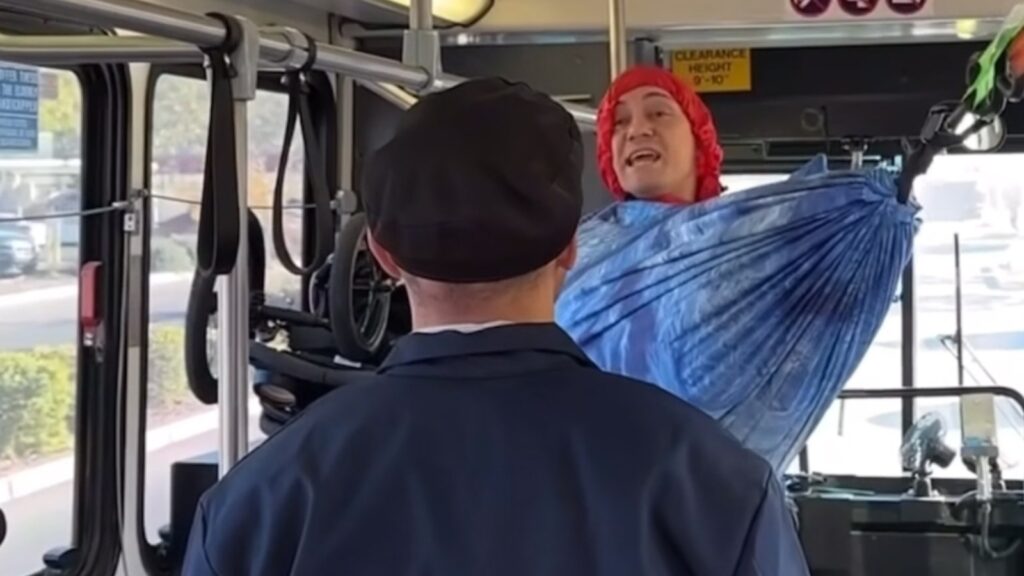Werewolf Billionaire CEO Husbands Are Taking Over Hollywood
“Guys, please watch this insane ad I got on TikTok,” the caption of a viral thread on X (formerly Twitter) read last month. The thread, which has more than 20 million views, contains clips from a film titled Forbidden Desires: Alpha’s Love, about a college professor named Adrian who falls in love with his student, who also happens to be his stepsister. Also, Professor Adrian is a millionaire. And a werewolf.
The plot begs a number of questions: Why does a werewolf millionaire need to hold a salaried job as an academic, albeit in an unspecified discipline? How does the university provost feel that his stepsister is in his classroom? And why does Professor Adrian look kind of like a hunkier Conan O’Brien? To quote Professor Adrian himself: “Stop asking questions for answers which you don’t need to know.”
Forbidden Desires: Alpha’s Love is one of many vertical series, a nascent sector of the Western entertainment industry consisting of feature-length soap operas broken down into approximately 90-second increments and consumed on your phone. The plots are simple — they either involve werewolves, billionaires, CEOs, vampires, or more often than not, a combination of all four — the scripts nonsensical, and the acting quality ranging from decent to sub-pornographic. The female lead is always clumsy, with flawless ombre waves; the male is tall, dark, wealthy, and brooding, in the model of 50 Shades’ Christian Grey. More often than not, the principals are young, conventionally attractive, and white. “They have a very specific look for all of these verticals. I like to call it the CW Network look,” says Kyra Wisely, an actor who has starred in such projects as Fated to My Forbidden Vampire.
The apps that host these vertical series are proliferating wildly, with one source estimating that between 30 and 40 projects are shot in Los Angeles per month. “Hollywood’s dirty with them right now,” says Troy Dillinger, an actor known for roles in Sleeping Handsome, Let’s Mate!, and Fool Me Once, Revenge on You. “They’re increasing in numbers exponentially.” Yet as the genre explodes, some of the nearly dozen actors and crew members who spoke with Rolling Stone say they’re chafing against the projects’ alleged grueling shooting pace, lack of racially diverse casting, and claims that they “take advantage” of struggling writers.
ReelShort
Hollywood insiders tend to view vertical dramas as the redheaded stepchild of the mainstream entertainment industry. But industry leaders are betting that won’t last long. “Sooner or later, vertical video streaming will become the next film industry in parallel,” claims Joey Jia, the CEO of Crazy Maple Studios, which operates the biggest of the platforms, ReelShort.
ReelShort has more than 30 million downloads and generates more than $10 million in revenue per month, according to Jia; in November 2023, it briefly outpaced TikTok in downloads on the App Store, rising to the Number Three spot.
The platform does not exclusively operate via a traditional, subscription-based streaming model, but provides users with free access to a select number of episodes before they must purchase “coins” to unlock the full series. (The series can cost between $20 and $40 to finish, though it’s possible to avoid paying by watching ads to earn free coins; users also have the option to purchase a one-time subscription.) It’s a paradigm shift from conventional wisdom about streaming, and that’s by design, according to Jia. “Hollywood is arrogant,” he says. “Unfortunately, their production structures, their content delivery methods, and content selection process are in the Stone Age.” By the end of this year, he predicts, verticals will be a billion-dollar industry.
The format originally became popular in China around 2020, starting off as short promo videos for popular web-fiction stories, according to journalist Margaret Sun, who has extensively studied the phenomenon. The companies expanded them into full-fledged series once they saw there was an audience for them. “For women, a lot of the time, there’d be these Prince Charming kind of stories,” Sun says. “And for men usually they were about revenge or becoming successful.”
ReelShort, an English-language vertical-series platform, launched in the United States in August 2022. At first, Jia says, the app “failed,” with initial original series receiving meager views. “We were focusing too much on the so-called character arc, and ignoring the elements people were really looking for,” he says. That element is what Jia refers to as the “hook,” essentially a cliffhanger within the first three minute-long episodes — what he calls the “golden three” — that gives people a reason to keep scrolling. “If you don’t follow this specific formula,” he says, “you will fail.”
In the spring of 2023, ReelShort released Fated to My Forbidden Alpha, essentially a werewolf-centric retelling of Cinderella. Clips started going viral on TikTok, particularly a scene in which the protagonist, Alpha Alexander Kane (played by the actor Kasey Esser) seduces his love interest by bringing her a bucket of fried chicken. Though the majority of comments were derisive, mocking the low production quality, the CGI werewolves, and the wooden dialogue, people were invested: The app garnered 1.5 million new users.
“Part of the benefit of these stories is that they are universal,” says Esser. “They’re stories that everyone can buy into, which is partially why these apps have done so well.”
A gym owner turned actor with corn-fed Midwestern good looks, Esser has shot a dozen vertical series for six different platforms in the past year and has become the genre’s breakout star; he says he hears from fans all over the world, who tend to be primarily single mothers in their forties and fifties. (Jia says the U.S. is ReelShort’s biggest market, followed by Indonesia and the Philippines.)
The international market share is precisely why the algorithmically generated titles — Married for Green Card, Stayed for Love, Snatched a Billionaire To Be My Husband — are so straightforward and specific. ”If our title is too literary,” Jia says, “nobody will understand.”
After ReelShort hit a record number of downloads in November 2023, it spawned a slew of competitors, including DramaBox, ShortTV, SerialPlus, and FlexTV, many of which are based in China; it also prompted a barrage of press coverage, with many articles comparing the vertical series genre to Quibi, Jeffrey Katzenberg’s spectacularly unsuccessful short-form content platform that started in 2020 and imploded eight months later.
One source in the industry, who spoke with Rolling Stone on the condition of anonymity due to fear of career reprisal, attributes the format’s success to both its low-budget production values and the timing of the app rollouts, which coincided with the writers’ and actors’ strikes. Because most of the actors are largely nonunion unknowns — and because most of the directors are young recent film-school graduates from Los Angeles — production costs are significantly lower than for platforms like Quibi, which touted A-list talent for its projects.
“Where Quibi failed due to a perfect storm of pandemic timing and expectations, these ‘mobisodes’ [mobile episodes] took off due to a vacuum that the back-to-back Hollywood strikes last year created, leaving actors and crew members literally starving for work,” the source says. “Any work, regardless of production value.”
Numerous actors and directors who work within this genre expressed intense gratitude that vertical series enabled them to work consistently. “A lot of people feel disillusioned about the film industry because of the strikes, and if you’re a narrative filmmaker, so much is about hustling and networking and enduring so much until you get a feature film credit,” says Peiqi Peng, a recent American Film Institute graduate and the director of such projects as Oops! I Married a Billionaire CEO. “[That’s] what attracts me to these shows — not a lot of people can say at this point in their career that they’ve directed narrative content.”
But some of the actors and directors who spoke for this article expressed discomfort with aspects of the production process, like how many lead roles are given to white actors despite ostensibly serving a diverse global audience. “Often, POC are placed in minor roles, meaning less pay and even less screen time,” says one source close to production. This individual said they had been told by producers that content featuring Black and POC actors did not perform as well in international markets, something Esser echoed. “They just go off the metrics and what works,” says Esser. “So if something’s not making money, they don’t do it.” He says he hopes to “see more inclusion in the future.” (Representatives for most major platforms, such as DramaBox and ShortTV, did not respond to requests for comment.)
The idea that films starring BIPOC actors underperform globally is not specific to vertical content, though a recent Hollywood diversity report from UCLA concluded it’s not based in truth: In 2023, for instance, nine out of 10 of the highest-grossing films released globally featured casts consisting of more than 30 percent people of color. Such numbers would seem to indicate that, even though the verticals industry is ostensibly relying on algorithm-driven technology to disrupt traditional methods of storytelling, its casting practices seem more rooted in outdated studio ideas about the global market.
For his part, Jia dismisses the idea that analytics or the preferences of international audiences inform casting. “We don’t decide the characters based on color,” he says. “We base [them] on personality. Frankly speaking, we do have a certain requirement to put a good-looking man [and] a good-looking lady on camera because that is by the stories’ design.” When I point out there are plenty of good-looking leading Black actors in Hollywood — few of whom appear to be prominently featured on ReelShort — Jia pointed me to one vertical series primarily starring actors of color: My Enemy Alpha, a werewolf romance series, though My Enemy Alpha is not currently promoted on the ReelShort homepage.

Courtesy of ReelShort
Brutal production paces and relatively low pay are also points of contention for some of the cast and crew members who spoke for this article. Due to the high volume of output of these apps, shoots can often be grueling, with cast members regularly putting in 12-hour days with only a 45-minute break for lunch. (The maximum amount of time performers can work on a SAG-AFTRA set is 12 hours, but the minimum day rate increases for every two hours worked after eight hours.)
Though verticals are often feature-length, shooting schedules are measured in days versus the weeks or months of a studio feature film. “When shooting sometimes two to three times the normal amount of scenes and setups in a day, the quality of these projects can only be so good,” the source says. (Jia confirmed the pacing, but said the company does not “squeeze time and sacrifice quality”: “We’re trying to make sure the entire delivery pipeline is healthy and consistent,” he says.)
Another source close to production referred to the work environment as “frantic,” an atmosphere that prevents actors from speaking up if they are uncomfortable with the content of the scripts (which they sometimes do not receive until after booking a role or even days into the shoot, according to multiple sources). That’s particularly an issue given the highly sexualized content in many vertical series: Though some casting listings do advertise for an intimacy coordinator on set, “actors are left feeling like it’s easier to just go with the flow than to speak up when they feel uncomfortable with a particular scene,” the source says.
Wisely, for her part, disputes this, saying that she feels “very, very safe” as a young woman on set. “The way these verticals are cast, there’s a lot of age-gap stuff. I’m consistently working with love interests who are 10 years or older than me,” says Wisely, who is 19. “So if I’m making out with a man who’s old enough to be my father, it’s nice knowing there’s an intimacy coordinator right there helping us feel more comfortable.” When asked about the handling of sex scenes on set, Jia says ReelShort employs an intimacy coordinator on every set, though this is not the case for every platform: “People feel safe. They [think] ReelShort is more professional,” he says.
Compensation was also an issue for some of the cast members I spoke with. Generally, lead actors earn between $300 to $500 a day for five to seven days of work, according to multiple sources who spoke with Rolling Stone. The series are also, almost without exception, nonunion. “We see that these shows get sometimes hundreds of millions of views, yet actors see no residuals from this, even when the series costs roughly $40 to watch per viewer,” says one source close to production.
ReelShort confirmed its actors do not receive residuals, but denies they are underpaid, with Jia calling the compensation “above market price.” The actors I spoke with also confirmed that ReelShort’s rates are higher than many nonunion projects; they are, however, significantly lower than the day rates for SAG-AFTRA features, which are $1,158 per day for performers, according to the SAG-AFTRA website.
Though some productions do credit cast and crew members, the practice is inconsistent between platforms, which can be a point of contention. “Most of [the vertical series] don’t even bother doing listing on IMDb,” says Dillinger. This appears to stem from a general lack of emphasis on casting, or actors in general, while developing such projects. “We don’t want to rely on characters. People are paying for the story,” Jia says. “I don’t want people to download ReelShort because, oh, Brad Pitt is in this film.”
Given the industry’s rapid growth — Hulu has reportedly taken interest in launching their own vertical content, according to Esser, though the platform did not respond to a request for comment — some cast and crew members who spoke for this article are pushing for sets to be unionized. While this is already happening somewhat on the micro level — a handful of casting listings for productions are applying for SAG eligibility — those who believe in the future of the genre, such as Esser, say it would only serve the industry to do so on a broader level.
“Inevitably if they want to continue to attract good talent, they will [do more SAG productions],” he says. ”Because at some point, I will be fully SAG, and I will no longer be eligible to do them. It’ll be more expensive for them, but I think it will benefit them in the long run.”

Kasey Esser
Lydia Lou*
Another consistent complaint is the quality of the screenwriting, which is, almost uniformly, borderline incoherent. Because screenwriters are often not explicitly credited, some actors tell Rolling Stone they were unsure if humans even wrote them. “I think a lot of these scripts are written by AI,” Ryan Watson Henderson, the star of Flash Marriage to My Werewolf Husband and My Husband Killed Me and Then I Won the Megaball, says. “There are certain beats in the story that happen, almost to a formula.” He considers this a compelling acting challenge unique to verticals: “I try to bring some of myself to it and hopefully make it as human as I can,” he says.
While representatives for most major platforms did not respond to requests for comment on if AI is used for scripts, ReelShort, at least, employs up to 20 (human) in-house writers and editors to generate its content, according to Jia.
Generally speaking, there is a degree of secrecy surrounding the writing processes of vertical series, though many of the sources I spoke with claim that many of the scripts for other platforms are originally written in Mandarin before being translated into English. “I was told they were translated by human beings,” says Leomax He, a director who has worked for platforms such as FlexTV and DramaBox. “But I don’t know. Some dialogue sounds like AI.” Actor Troy Dillinger says he once pushed back against a literally interpreted stage direction for a series (not on ReelShort) requiring his character to beg for something “hat in hand.”
“They had this ridiculous fedora from Target. I was like, ‘I’m not wearing that. ‘Hat in hand’ is just an expression,’” he says. “And they were like, well we talked to the client, and you have to have the hat in hand.’ So I was like, ‘OK, just give me the fucking hat.’”
Most of the vertical platforms adapt preexisting web-fiction stories to produce their content, though this process appears to vary from platform to platform. When asked about the contracts and rates ReelShort provides to web-fiction writers to adapt their stories, Jia declined, citing the existence of non-disclosure agreements.
But I did speak to an author who had their story adapted by another vertical-shorts platform, a competitor to ReelShort. The author, who requested they remain anonymous due to fear of income loss, says they joined the app GoodNovel two years ago, signing exclusive rights to their story over to the app in exchange for a share of royalties — essentially, the costs users spend to read the book.
The author declined to share how much they initially made off their story, but the GoodNovel website states that authors who sign an exclusive contract with GoodNovel are given an initial $100 “signing bonus” when their book reaches 30,000 words, as well as a $250 “completion bonus” once the book exceeds 120,000 words.
The author says GoodNovel approached them last year to inform them the vertical-shorts platform would be adapting their story into a vertical series. While the author was initially “excited” by the news, that wore off when they saw the final product. “They changed my bestseller into a crappy drama,” the author said.
When reached for comment, a representative for GoodNovel declined to discuss the specifics of author compensation or rights, stating such details are “proprietary” and the platform is “not at liberty to disclose the financial arrangements or the specifics of author royalties.” The representative did point out, however, that “protecting copyright and ensuring the lawful rights and interests of authors have always been at the core of GoodNovel’s mission,” and that it is “committed” to maintaining these principles.
Another writer I reached out to, JP Sina, the author of the story behind ShortTV’s My Forbidden Alpha, said via DM that she “regret signing” with ShortTV to adapt her online novel. “The contract was vague, and I feel like they [take] advantage of app authors,” she says. “[They] gave me a pitiful payout and changed my entire book…. I have zero control over what they are doing, and make zero dollars monthly royalty.” When asked about specifics of the contract or her compensation, she declined to comment further. “You will want to find someone else who is happy to sign away their book for pennies,” she says. (ShortTV did not respond to a request for comment.)
Actors and crew members also expressed frustration with some of the themes popular in vertical series, many of which they perceive as highly retrograde. “The plots for the most part can be pretty not woke,” says actor Wisely. “A lot of the female main characters can be very infantilized at times. They love a good Cinderella plotline of, ‘this woman’s life sucks and she’s abused by people around her, but then her whole life magically gets better when this rich man comes in and saves her.’”
Some actors also chafed against the repetitiveness of the themes used in the series, which typically consist of some variation or amalgamation of the billionaire CEO, werewolf, or vampire tropes. They also took issue with the dialogue, which Dillinger characterized as occasionally “unspeakable,” saying the actors are sometimes forced to make rewrites to the script. Henderson likens it to “the types of dialogue that Barbie dolls would have when you’re playing with kids.”
Jia initially denied recycling themes; when I pointed out that it was obvious from the ReelShort content library, which features titles such as Snatched a Billionaire To Be My Husband next to The Double Life of My Billionaire Husband next to Never Divorce a Secret Billionaire Heiress, he conceded that plots are generated algorithmically, based on what has previously performed well. “We have to be very cautious and count on each penny we spend,” he said. “We want to be innovative, but we have to be sure that we can make money back.”
Jia is upfront that he doesn’t particularly care about the quality of ReelShort’s content, repeatedly referring to stories as “IP” and appearing dismissive of basic screenwriting principles. “The reason why some people make a [film] is because it’s a director’s dream, or someone else’s dream,” he says. “For us, the purpose of designing a story is promotion. So if a story cannot be promoted, that’s trash.” He compares watching ReelShort to “reading USA Today, not The Wall Street Journal.”
Due to the relatively low production quality, some actors and directors I spoke with feel the future for verticals is limited, at least within mainstream Hollywood. “I think putting too much stock in them might make Hollywood seem like a little bit of a joke,” says Wisely. “If a casting director in Hollywood is looking at my credits, and my IMDb says Oops, I Married a CEO by Mistake, they’re gonna be like, this really doesn’t mean anything to me.’”
But as the phenomenal success of TikTok, as well as the explosion of TikTok-native stars such as Charli D’Amelio and Alix Earle, have amply demonstrated, the mainstream industry underestimates the transformative power of social media at its own peril. With TikTok’s future in dispute due to its foreign ownership, it seems unlikely that American entertainment industry giants would leave the future of a multimillion-dollar market exclusively to overseas competitors — even if the content is, at least for now, perceived as something of a joke.
Esser, for one, is a true believer in the future of the vertical format. He is extremely active on social media, connecting with fans by selling T-shirts on his website and videos on Cameo. “Other actors have one foot in, one foot out, because they want to do artsier movies and TV, which I totally get,” he says. “But for me, I see the potential in the audience building, the platform building and what this could become. So I’ve really gone all in on the marketing side of it.” He plans to launch his own app for vertical dramas by the end of the year, believing that as marketing and demand ramp up, the product will invariably improve, as will the standards for professionalism on sets. And the inherently addictive nature of the content simply cannot be denied.
“People obviously make fun of them, like, ‘Oh, these are cheesy,’” he says. “But I always say: Well, you’re watching them. Whether you love it or hate it, you watched it.”





